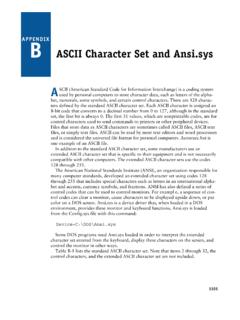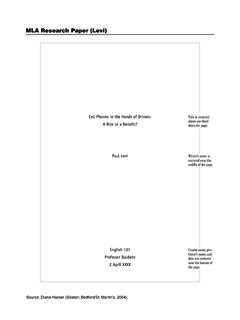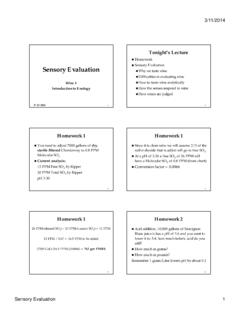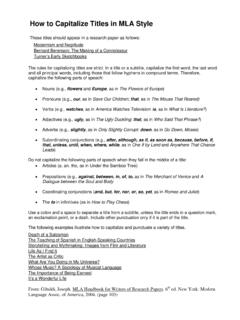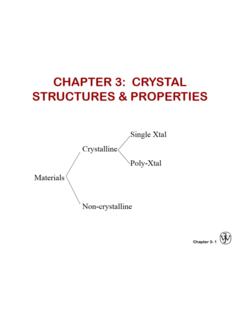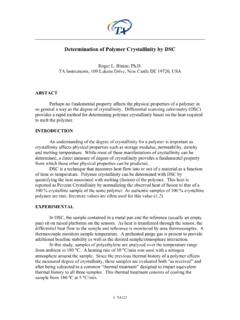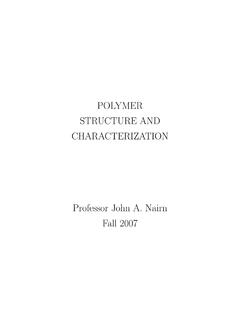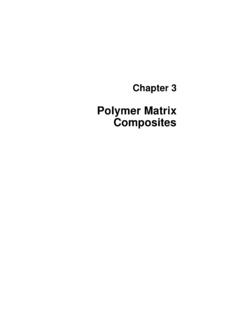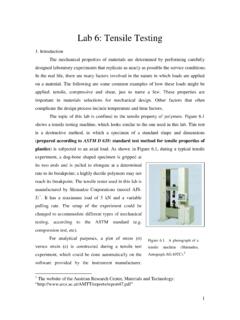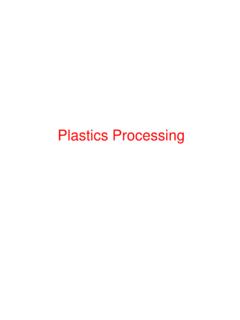Transcription of Carbon Fiber Reinforced Polymer
1 Carbon Fiber Reinforced Polymer - Abdul Mohaiman - Andrew Washington - Chris King - Dominic DeMartini Material * Carbon Fiber Reinforced Polymer (CFRP) is an extremely strong and lightweight Fiber Reinforced Polymer . * CFRP is usually expensive to manufacture but used wherever a high strength-weight ratio is needed. * It is Common in automotive, aerospace, civil engineering, and sports industries. Automotive Applications Carbon Fiber is generally used in high end racing applications, where the high cost is offset by the unsurpassed strength-to-weight ratio, where low weight is critical. The main use in racing that uses its high strength is in monocoque or safety cell . This is the area in which the driver or passengers sit and supports the main structural support of the vehicle. Many production super cars have adopted this racing technology for use in their street cars, having complete monocoque chassis. The low weight but high strength of Carbon Fiber allows the frames to be smaller and lighter while still extremely strong.
2 Aerospace Applications Recently Carbon Fiber has become a major material in the manufacturing of commercial aircraft namely the new Airbus A350 and Boeing Dreamliner. Both of these huge aircraft are made from at least 50% Carbon Fiber Reinforced materials. Use of Carbon Fiber in flight is not new, it was even being used back in 1968 as fan assemblies. It is used commonly in aircraft, ranging from the new private manned Spaceship One to Ultra-lightweight and micro aircraft. Civil Engineering Applications CFRP have become a notable material in structural engineering, being used in number of field applications including: strengthening concrete, masonry, steel, cast iron, and timber structures. Carbon Fiber has also become an increasingly popular uses in retrofitting old buildings and bridges by reinforcing existing parts of the structures. The high cost is often mitigated by the fact that it would usually be much more expensive to replace the parts rather than just reinforce them.
3 Sports Goods Applications Carbon Fiber has become common in many different pieces of sports equipment. In bicycle frames it is used for its extreme lightness. A CFRP frame weighs less than a Aluminum, titanium, or steel frame. It is also used in tennis, badminton, and racquetball rackets as well as golf clubs, fishing rods and many other uses. Hand Laid Construction Hand laid is the simplest method of making CFRP parts but it typically leaves a rough finish and consumes a greater amount of Epoxy Resin( Polymer ). Carbon Fiber cloth is cut into layers of desired shape and hand laid, layer by layer, into the mold. Between each layer up, the previous hand laid layer Is completely saturated in Epoxy resin and rolled/brushed to eliminate air bubbles being trapped between layers. Vacuum Bagging Construction Vacuum Bagging refers to the method of constructing CFRP in which negative pressure from vacuum is used to remove excess Epoxy Resin from the part.
4 Parts made using this technique generally have smoother finish, smaller thickness and lighter weight. Vacuum Bagging is a ideal method for making aesthetically pleasing parts. Vacuum Bagging Construction Vacuum Bagging supplies at basic consists of: bagging film, vacuum port, absorber cloth, perforated release film, bagging tape and a source That can introduce adequate vacuum. Research Our purpose was to find the difference in strength between Aluminum bend test samples and same samples with varying layers of CFRP as reinforcement. Our second objective was to find the strength difference between hand laid sample with 12 layers of .010 oz Carbon Fiber and a vacuum bagged sample of same amount of Carbon Fiber . Data Stress-Strain curve Sample 1 (6 Layers CF added). 35000. 30000 y = 2E+07x - Modified Stress (psi). 25000. 20000. 15000 Al 10000 Al+CF. y = 5E+06x + 5000. 0. 0 Modified Strain (in/in). Sample 3 (12 Layers CF added). 70000. 60000.
5 Modified Stress (psi). y = 4E+07x + 50000. 40000. 30000 Al 20000 Al+CF. 10000. y = 5E+06x + 0. 0 Modified Strain (in/in). Data Stress-Strain curve Carbon Fiber Samples 14000. 12000. y = 4E+06x - 10000. Modified Stress (psi). 8000. Al y = 5E+06x + 6000 CF Hand-Laid CF Vacuum Bag y = 2E+06x + 4000. 2000. 0. 0 Modified Strain (in/in). Data Stress-Strain curve combined Stress-Strain Curves (Elastic Region). 70000. 60000. 50000. Modified Stress (psi). 40000 Sample 1 Al Only Sample 1 w/ CF 6 Layers Sample 2 w/ CF 9 Layers 30000 Sample 3 w/ CF 12 Layers CF Only 12 Layers Hand-Laid CF Only 12 Layers Vacuum Bag 20000. 10000. 0. 0 Modified Strain (in/in). Results As predicted, the CFRP layered Aluminum samples were highly strengthened. For pure CFRP, the resultant Modulus of Elasticity from the Bend Test were similar. In all cases, the resultant Yield Strength ( ys ) from Bend Test were significantly higher. Credits Abdul Mohaiman Andrew Washington Chris King Dominic DeMartini From left to right: Abdul Mohaiman, Andrew Washington, Dominic DeMartini and Chris King #mediaviewer/
